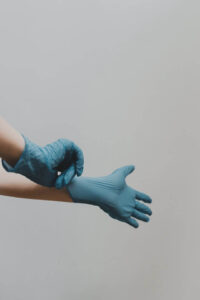Caregivers probably know that changing an adult family member or friend’s diaper is a delicate process. If this applies to you, there are some things that you can do to make this as comfortable and convenient as possible for both yourself and your loved one.
Keep reading this guide to learn about the right items that you need, which diaper types work best, and everything else that has to do with diapering a sick, elderly, and/or disabled adult.

What will you need to change an adult diaper?
Disposable Gloves
In general, disposable gloves can be made out of latex, nitrile, or vinyl material. You want to choose diaper-changing gloves that suit your budget and the patient’s preferences.
In short, here are the main differences between the glove materials:
- Latex: While latex gloves are costlier than their vinyl counterparts, they are more comfortable and durable. For that matter, medical-grade gloves that doctors and nurses rely on are made out of latex. Having said that, these gloves aren’t appropriate for patients with latex allergies.
- Nitrile: These are the most expensive, but also highest-quality, gloves, especially when it comes to durability and strength. Since nitrile is made out of petroleum, it is best to avoid them when your sick or elderly loved one is sensitive or allergic to it.
- Vinyl: These are your cheapest option. However, you must be gentle when you use vinyl gloves because they are more likely to get ripped than those made out of latex or nitrile material.

Clean Adult Diaper
Adult diapers are specifically designed for those with incontinence issues or disabilities that make it difficult for them to use the restroom.
When you choose an adult diaper for your sick or elderly loved one, you should ensure that they have the following qualities:
- They are easy to put on and secure. Many adult diapers have straps or buckles.
- The material is strong and doesn’t break or leak. At the same time, it doesn’t trap harmful or toxic vapors and allows them to escape.
- Diapers that don’t make a lot of sounds are ideal for privacy, particularly if your family member or friend regularly goes out in public or interacts with others.
- They have tabs that make them flexible and comfortable to wear.
Plastic Bag
You want to get a plastic bag that you can seal. It should also trap the odors and prevent leaking.
Wet Wipes
Firstly, you need to obtain the right type of wipes. There are many differences between baby, adult, and wet wipes.
Adult wipes are larger than those made for babies, and they have additional scents and moisturizers that fend off bad smells and avert skin sensitivities, respectively.
Meanwhile, wet wipes include disinfectant and antibacterial contents that are more effective for cleaning bodily fluids and waste. However, it is crucial to make sure that you use wet wipes that are specifically designed for the skin and sensitive areas.

Barrier Cream (If Needed)
Barrier creams can prevent skin breakdown and diaper rash problems from developing. Although wet and adult wipes can efficiently clean and disinfect the skin, adults that have sensitivities, irritations, and or allergies may require a barrier cream after their diaper is changed.
Applying the barrier cream isn’t difficult as long as you’re in the right position.
Positioning Yourself to Change an Adult Diaper
Firstly, your sick or elderly loved one should lay flat on their back. Secondly, you want to stand to their right or left side (depending on which is closest to you), with your body facing towards the diaper.
If the patient is on an adjustable bed that you could move, pull it close to your hips while they’re laying on their back.
After that, you can begin to change your family member or friend’s diaper.
Changing the Adult Diaper
In the following order, these are the steps for changing your loved one’s diaper:
- Put on new and unused gloves.
- Open the diaper. Many adult diapers have straps or buckles that make it easy to do so.
- Tuck the side that’s furthest from you underneath the patient.
- Have them roll over so that they’re body is facing towards the far side and away from your hips. In other words, you want their back to be in front of you. When they can’t move on their own, you should roll them over very gently.
- Thoroughly clean and disinfect the patient by using adult or wet wipes (and barrier cream when necessary).
- Put the diaper in a plastic bag and seal it.
- Give the skin time to dry and, as you wait, start preparing the new diaper.
- Put the new diaper on your loved one. If your loved one is laying on an adjustable bed, readjust it back to its original position (or to one that makes them comfortable).
- Throw the plastic bag and any garbage away in the bathroom’s trash can or your outside dumpster. You need to avoid disposing of diapers in bedroom, kitchen, or living room trash cans to minimize odors and bacterial emissions.
- Finally, wash your hands.
At the beginning, these steps may sound delicate and challenging. However, the more you do them, the more effortless they become.

How often should an adult diaper be changed?
There isn’t a specific number of times for changing an adult’s diaper. That is to say, how often you change it depends on the patient.
Nonetheless, you should regularly check on your loved one to see if they have any rashes or skin irritations that require a new diaper.
Apart from that, when and how often you change your sick/elderly family member or friend’s diaper will depend on what makes them most comfortable.
Tips for Diapering an Adult
Here are a few ways for you to make diapering as convenient as possible for your loved one:
- Maintain a good and positive attitude.
- If it’s easier, have someone assist you.
- Strap or secure the diaper in a manner that’s not too tight or loose.
- Ensure that the top and bottom tabs are facing downwards and upwards, respectively.
- Only choose diapers that are the right size.
Buying a high-quality diaper from a renowned brand can make things even more convenient and comfortable for your loved one.
Best Diapers for Adults
The following three products are among the best adult diapers that the market has to offer:
McKesson Ultra Pull On Underwear
The main advantages of the McKesson Ultra Pull On is that the diapers are comfy and discrete. They also come with an odor guard and are made out of heavily-absorbent material.
These diapers are suitable for both men and women, and the waist and hip sizes range between 25 to 32 inches (for small diapers) and 68 to 80 inches (2XL ones).
Prevail Maximum Protective Underwear
Similarly, Prevail’s Maximum Protective Underwear is designed for unisex usage.
The noteworthy features of these adult diapers are that they are ultra-absorbing of moisture and just as comfortable (and discrete) as regular cloth underwear, especially when you consider the skin-friendly fabric that they’re made out of.
The smallest waist/hip size starts at 34 inches, and they go all the way up to 80 inches for the largest diapers.
Tranquility Premium Overnight Disposable Absorbent Underwear
Lastly, but definitely not least, are the Tranquility Premium Overnight Disposable Absorbent Underwear. They are made with your loved one’s quality of sleep in mind. Each diaper can absorb up to 34 liquid ounces of fluid.
Moreover, this product minimizes odors, prevents the skin from getting dry, has a cloth-like appearance, and is relatively easy to put on and take off.
The smallest two hip/waist sizes (17 to 28 inches for extra small and 22 to 36 inches for small) are capable of taking in over 20 cups of fluids. All the other sizes (including the biggest one, 2x-large for 62 to 80-inch hips/waists) can absorb as much as 34 cups.
Regardless of which diaper type you use, you want to initially assemble all the right items that you need, ranging from disposable gloves to barrier creams.
After that, as you get accustomed to the positioning and steps of diapering an adult, the process will become seamless and comfortable for you and your loved one over time. Choosing the right diaper can only help.
